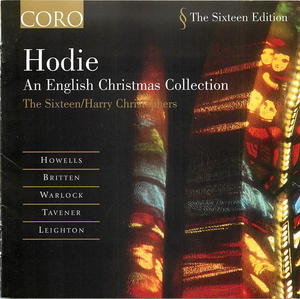
Hodie: An English Christmas Collection
conducted by Harry Christophers, 1953-; produced by Peter Hayward, 1955-; performed by Nicola Jenkin, Patricia Forbes, Christopher Royall, Neil MacKenzie, Simon Birchall, Sioned Williams, Sally Dunkley, Libby Crabtree, Robin Jeffrey, Ruth Dean, Benedict Hoffnung, William Lockhart and Margaret Philips, The Sixteen (Coro), 1 hour
Details
- Field of Interest
- Classical Music
- Conductor
- Harry Christophers, 1953-
- Content Type
- Music recording
- Duration
- 1 hour
- Recording Engineer
- Mike Hatch
- Ensemble
- The Sixteen
- Format
- Audio
- Sub Genre
- Carol, Anthem, Motet
- Label
- Coro
- Performer
- Nicola Jenkin, Patricia Forbes, Christopher Royall, Neil MacKenzie, Simon Birchall, Sioned Williams, Sally Dunkley, Libby Crabtree, Robin Jeffrey, Ruth Dean, Benedict Hoffnung, William Lockhart, Margaret Philips
- Producer
- Peter Hayward, 1955-
- Date Recorded
- 1990
- Review
- The centerpiece of the Sixteen's collection of Christmas music by late Romantic and modern English composers is Britten's Ceremony of Carols. Harry Christophers, founder and conductor of the Sixteen, writes that performances of the piece have become so routine that practices alien to the composer's intent have become enshrined and unthinkingly repeated from performance to performance. Christophers' intent is to look freshly at the score and follow it faithfully and without preconceptions. His performance does, in fact, sound newly imagined, with some surprises in tempos, dynamics, and articulation that make good musical sense. Most noticeable is maintaining the same tempo throughout "This Little Babe," Britten's frighteningly close three-part canon, which when taken at the correct speed can inspire fear in both performers and audience, as well it should. At the end of the piece, in most performances, conductors allow the tempo to go slack, as if in relief at making it through the hard part. Christophers keeps precisely to the original tempo, allowing Britten's longer note values to provide the respite from the torrent preceding it, and it's highly effective. Christophers is a stickler, to good effect, for precision in articulation, giving the work more varied textures than some performances have. He also maintains a refreshingly strict adherence to the proper pronunciation of the Middle English. The ensemble, which includes female sopranos and altos and male altos, sings with such pure, straight tone that the listener is hardly aware that they are not treble voices. For the remainder of the album, the full mixed ensemble sings with rich, warm tone, as is appropriate for the repertoire. The various soloists from the group are polished but natural sounding. Other pieces that stand out are Tavener's astringent "The Lamb," Howells' "A spotless rose" and "Sing lullaby," and John Gardner's vivacious "Tomorrow shall be my dancing day." Coro's sound is clean, natural, and spacious. ~ Stephen Eddins, All Music Guide
- Subject
- Classical Music, Music & Performing Arts, 20th Century, Siglo XX, Século XX
- Keywords and Translated Subjects
- Siglo XX, Século XX
